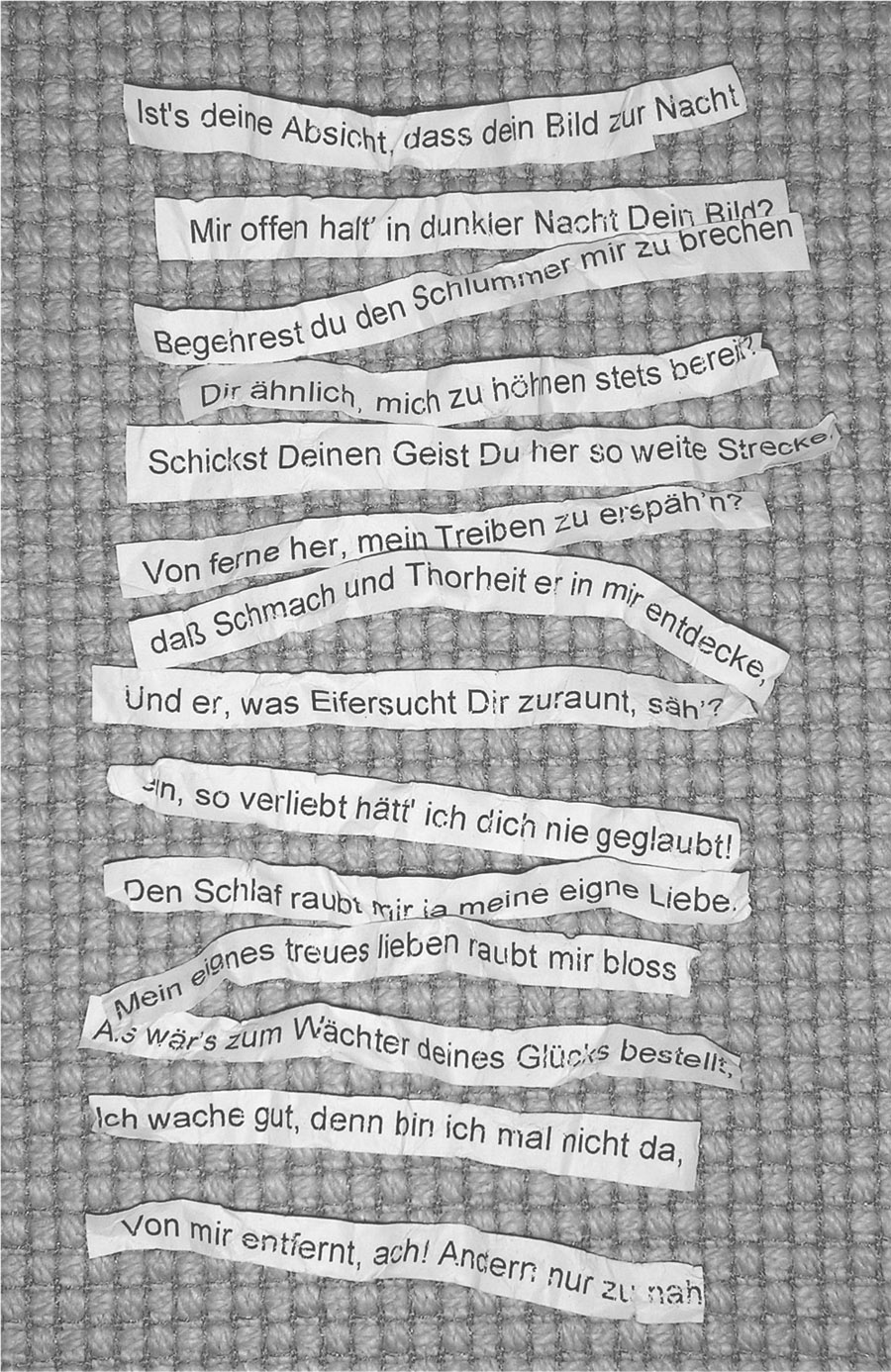In celebration of the release of Telephone Journal’s first full-length book, The Sonnets, we’re featuring Uljana Wolf’s translation of William Shakespeare’s Sonnet 61.
From the introduction to The Sonnets, edited by Sharmila Cohen & Paul Legault:
“In this anthology… we have invited 154 poets to each translate one [of Shakespeare's] sonnet from English to English. Of course, we are aware of the many translations of Shakespeare’s works into modern English… We also want to offer a new and contemporary understanding of Shakespeare, but something beyond that of simply breaking through the boundaries of an ever-changing lexicon—our hope was that the contributors would approach the original texts from their multitude of vantage points, that they would board the ship, loot and pillage, break things down, and reconstruct it all in a fashion that would allow us to view multiple dimensions of the original work in a new light, as a new structure.”
shakespeare 61 (who’s watching)
by Uljana Wolf
what is wakefulness in translation? spaces between words: not a blink, but clouds in the shape of sheep. count them. in german, tired eyelids are kept open with matches. a gap and they stick to it. with or without their red heads? certainly, a glow. a stick-up for sleep. and when, in this deep light, you rub against each word, tossing and turning, you will find meanings shifting their shapes every minute—shadows like to thee, mocking, ungraspable. translation is this lament: you are so far from me—transformed into a sustained and reversed lullaby. do you watch clouds change their shape, or do you, by watching, change them? minutes grow into hours, hours into a wake. not over a dead body, but over one that is so alive as to be constantly absent, slipping away—far off, with others all too near. being awake in translation means to trace this distance, but never close the gap (eye, mouth), to keep alive the presence of the absent other and at the same time unmask one’s own desire to merge with it, to finally meet one’s match. in the space between the distant lovers (languages), this process unfolds as a shift from passive to active mode, a shadow play of failure and empowerment. first i am kept awake by the ghost of your language, then my language feels alive and awake because it watches yours—thereby creating its own images and
slumberbreaking spirits. thus one could lament that ‘to watch’ also means to look intensly and/or wait in english, and that in german you’d wait for those meanings forever. but one could also point out that in german, unlike english, the words for being awake and keeping watch still show their common origin by sharing the exact same shape—wach and Wache halten—suggesting, perhaps, that being awake is not simply a state but the process of being constantly alert, of being watched by others and transgressing their watch at the same time. that it is in fact—like translation—a complicated collaborative process rather than a state or the result of not sleeping. gemeinsam wachsam—or else, idle hours. what, then, is a watchman in translation? she’s someone who lets the sheep slip past the matches. a shepherd of defeat who intimately knows their desire to always be where the others are, and who also knows that, if they ever arrived at this distant, imagined place which slightly resembles Benjamin’s Ursprache, language would stop wanting, waking and watching altogether, it would simply fall asleep. to make sure it doesn’t, 14 different german translations, cut up line by line, were used to form clouds that generated the translation of this particular poem, which was then translated back in to english. who’s watching now?
Is it your aim that at night your image
Markus Marti ca. 2009
Keeps open your image in the dark night?
Ferdinand Adolph Gelbcke 1867
Do you desire to rupture my slumber—
Gottlob Regis 1836
Alike thee, and ready to ridicule me?
Alexander Neidhardt 1870
Do you send your ghost such a long way,
Fritz Krauss 1872
from far away, to spy on what I do?
Emil Wagner 1840
that infamy and folly he shall find in me
Fritz Krauss 1872
And will, what jealousy breathes to you, see?
Ferdinand Adolph Gelbcke 1867
No, I never thought you to be so in love!
Markus Marti ca. 2009
My sleep is robbed but by my own love
Christa Schuenke 1994
my own true loving simply robs from me
Stefan George 1909
As if I were designed to be the watchman of your bliss
Terese Robinson 1927
I’m good at watching, cos in case I am not here,
Markus Marti ca. 2009
Afar from me, oh! too close to others everywhere.
Ferdinand Adolph Gelbcke 1867
more>>
shakespeare 61 (who’s watching)
by Uljana WolfIs it your aim that at night your image
Markus Marti ca. 2009
Keeps open your image in the dark night?
Ferdinand Adolph Gelbcke 1867
Do you desire to rupture my slumber—
Gottlob Regis 1836
Alike thee, and ready to ridicule me?
Alexander Neidhardt 1870
Do you send your ghost such a long way,
Fritz Krauss 1872
from far away, to spy on what I do?
Emil Wagner 1840
that infamy and folly he shall find in me
Fritz Krauss 1872
And will, what jealousy breathes to you, see?
Ferdinand Adolph Gelbcke 1867
No, I never thought you to be so in love!
Markus Marti ca. 2009
My sleep is robbed but by my own love
Christa Schuenke 1994
my own true loving simply robs from me
Stefan George 1909
As if I were designed to be the watchman of your bliss
Terese Robinson 1927
I’m good at watching, cos in case I am not here,
Markus Marti ca. 2009
Afar from me, oh! too close to others everywhere.
Ferdinand Adolph Gelbcke 1867


